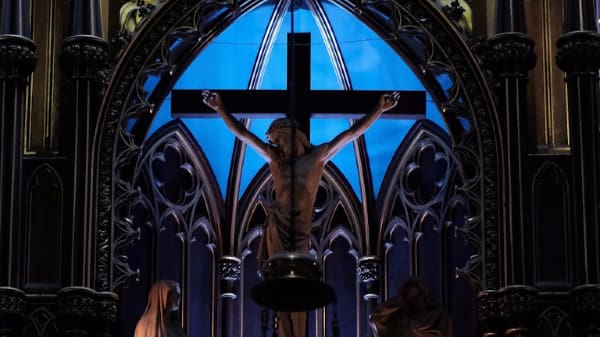If “Jesus paid it all,” as the hymn says, why do we still suffer? Why doesn’t God wisk everyone up to heaven the minute they are baptized, or for non-Catholics, pray the sinner’s prayer?
Because Jesus paid the eternal consequences that we could never pay, but He left to us the earthly consequences of suffering and made them redemptive. Suffering is meant to purify. “Since therefore Christ suffered in the flesh, arm yourselves with the same thought, for whoever has suffered in the flesh has ceased from sin, so as to live for the rest of the time in the flesh no longer by human passions but by the will of God” (1 Pet 4:1-2).
Whatever we call it—salvation, sanctification, purgatory—the Bible speaks of a lifelong process of becoming holy that ends in God’s arms. As a Catholic Bible study author, broadcaster, and speaker, I am often dismayed at how purgatory is taught to the faithful, and how frequently Catholics have grown up to fear something that is a priceless and profound gift. What do I mean?
I’ve read purgatory is the absence of God till we are clean enough to enter His presence. I’ve seen purgatory depicted as another, milder hell, as in Medieval art, with its grotesquely deformed faces of those suffering in purgatory. I’ve heard purgatory likened to waiting at the train station for someone you deeply love and miss to arrive. But each of these descriptions necessarily falls tragically short of a deeply Personal truth.
Not a Place
Purgatory is not a milder hell, a less joyful heaven, or a third place or sort of waiting room in between. We use place and time language to help us understand, but in fact, purgatory is not a place nor amount of time at all. The train station metaphor is incomplete because it makes God and the “waiting” or “purifying” seem like two separate things when they are actually one thing, the same One.
Places are of time and matter, both creations of God. God transcends both time and matter as pure Spirit. There is nothing physical of God to see, hear, or sense at all unless He makes Himself felt or sensed. Nor is He stationary in places; “He does not dwell in temples made with hands” (Acts 7:48). No created time, thing, or place can contain Him.
“To God, all moments of time are present in their immediacy” (Catechism of the Catholic Church, 600). As such, he is in all places and times all the time— omnipresent. God exists everywhere—in every moment past, present, and future—in the single present moment of I Am. He can never be absent to anyone or anything, ever: “in Him we live, and move, and have our being” (Acts 17:28). So rather than a place or amount of time, or the absence of God, purgatory is a state of the soul in God.
A Person
The Bible speaks of God, throughout, as a fire—a spiritual fire, but fire, nonetheless. In the Abrahamic Covenant, He is depicted as a torch and burning oven (Genesis 15:1-17). He appears to Moses in a burning bush that is not consumed (Exodus 3:1-8). The Passover lamb is roasted in fire (12:8-10). He leads His people through the wilderness in a pillar of fire (Exodus 13:17-21). He thunders in fire on Mt. Sinai at the giving of the Decalogue (Exodus 19:18-19).
He falls from heaven in fire when accepting sacrifices of the altar (Leviticus 9:23-24, Judges 6:21, 1 Kings 18:38). He enters the temple in fire (1 Kings 8:38). He receives Elijah into heaven in a chariot of fire (2 Kings 2:11). The Holy Spirit rests upon men in tongues of fire at Pentecost (Acts 2:3). Heaven and earth will be renewed at the end in fire (2 Peter 3:12-13).
The fire is judgment (Amos 5:6); the fire is purification (Malachi 3:2); the fire is love (Song 8:6); the fire is the Person of God: “Our God is a consuming fire” (Hebrews 12:29).
Earthly Purification in Prayer
The Doctors of Prayer and mystic saints speak of a Dark Night of the Soul in prayer. The pain of that darkness feels empty and desolate, but in reality, the darkness is God Himself, purifying the soul in His presence. It feels painful, desolate, and dark because our love is impure; we resist what He offers when it’s painful. We strain toward Him in prayer, longing for His touch, never realizing He is present in an embrace of purifying, engulfing darkness. Contemplatives will tell you this experience of God overwhelms the soul in a shocking, painful, humble yearning that makes one lean in and want to die with the bliss of it, and suffer any indignity or sorrow to possess it more fully.
This is the deep earthly purification that John of the Cross and other Doctors of Prayer say is the Dark Night of the Soul; it is God Himself present to the soul, only darkly in purification. “He hides Himself in darkness…” (Ps 18:11). The same is true of purgatory, only much more acutely felt for the clarity afforded by the lack of a physical body and the removal of comfort-seeking or self-medication.
An Unassailable Tradition
Pope Benedict the XVI says that the writings of the mystics did not begin with death and the torments of an exterior purgatory, and then outline the way to purification and conversion. Rather than a “place” or “time” in the depths of the earth with an exterior fire, they saw purgatory as an interior spiritual fire, the soul’s experience and awareness of God’s immense love and absolute justice. The soul suffers for not having responded appropriately or fully to the perfect love it “sees” and experiences.
Those in purgatory “see” this love more clearly and painfully because they exist in a spiritual state without the filter of a physical body, but the pain is bliss in the dual sense of sorrow and love that the word “passion” encompasses. Saint Faustina shares in her diary, “I asked these souls what their greatest suffering was. They answered me in one voice that their greatest torment was longing for God.”
The soul understands and experiences, as it was unable to before, that the perfect Love extended to it throughout its life deserves the soul’s lifelong, undivided, all-consuming devotion; anything less is painfully unjust (see 1 Corinthians 3:15).
The suffering the soul experiences in “seeing” this love is just, and is the simple, natural consequence of habitual separation—even teeny tiny separations—of one’s will from God’s will, which is always love. “It is precisely the love of God himself which purifies the soul from the ravages of sin.”
St. Catherine of Genoa, known as the “Apostle of Purgatory,” wrote in her Treatise on Purgatory, “Either in this life or in the life to come, the soul that seeks union with God must be purged by ‘The fiery Love of God.’ The holy souls are purged of all the rust and stains of sin which they have not rid themselves of in this life. The fire of purgatory is first of all The Fiery Love of God.”
State of the Soul
In St. Thomas Aquinas’ Summa, Pope Gregory was quoted as saying that the fire of purgatory and the fire of hell are also the same fire: “‘Even as in the same fire gold glistens and straw smokes, so in the same fire the sinner burns and the elect is cleansed.’ Therefore the fire of Purgatory is the same as the fire of hell” (Summa on Purgatory, Article 2).
Although the distinctions in levels of places and duration (as in Dante’s Divine Comedy) help us picture and understand better, they are necessarily incomplete and sometimes confuse more than clarify. Heaven’s beatific vision is not a separate physical “place” from purgatory or hell. They all exist, as do all things, in God as spiritual states: “In Him we live and move and have our being” (Acts 17:28).
The fires of hell, the suffering fires of purgatory, and the all-consuming bliss of beatitude are one thing, the same One. When the soul is freed from the confines, and limits, and filter of the physical body, it rushes back to the Love from whence it proceeded. That soul’s experience of His presence will be hell, purification, or the light of beatitude, depending on its conformity or lack of conformity to God’s love.
No one can ever escape God’s all-consuming love. Satan suffers so greatly because he was created and exists in God’s love, yet he hates and rejects it for all eternity. We, too, can reject God’s love; we can cooperate with it in purification (a matter for another article), and/or experience its light and bliss in union with Him. But nothing that is, exists outside of that all-consuming love. If a thing were not loved by God, it would cease to exist.
Rather than waiting at the train station for our Love to arrive, purgatory is more like Beauty and the Beast, where we slowly, almost accidentally, fall in love with the “Beast” (suffering love) in all His beastly hardness and difficulty, and realize at the end that He was the Prince all along. He is with us all along, good and beautiful and purifying us in His dark, all-consuming fire of love all along.
Summary
Throughout Scripture, God revealed his all-consuming love for his people through fire, “for our God is a consuming fire” (Hebrews 12:29, emphasis added). What a thrilling thought.
“Set me as a seal upon your heart, as a seal upon your arm; for love is strong as death, jealousy is cruel as the grave. Its flashes are flashes of fire, a most vehement flame” (Song of Solomon 8:6). Love, in the end, is all that matters, because God is love. That is why “[a]t the evening of life, we shall be judged on our love” (St. John of the Cross).
The “fiery trials” and sufferings we experience in our lives and in prayer are ultimately the presence of God accepting our many daily offerings of love throughout the primary offering of our whole life: heart, soul, mind, and strength. This fiery presence purifies us with the strength of His love, and so He is the fire of purgatory. God, Himself, is the fire that purifies and saves us (see 1 Corinthians 3:12-15).
___
Sonja Corbitt is the Bible Study Evangelista and creator of the LOVE the Word® Bible study method. Find more information on purgatory in her study Fulfilled, Uncovering the Biblical Foundations of Catholicism.
Image courtesy of Unsplash.




